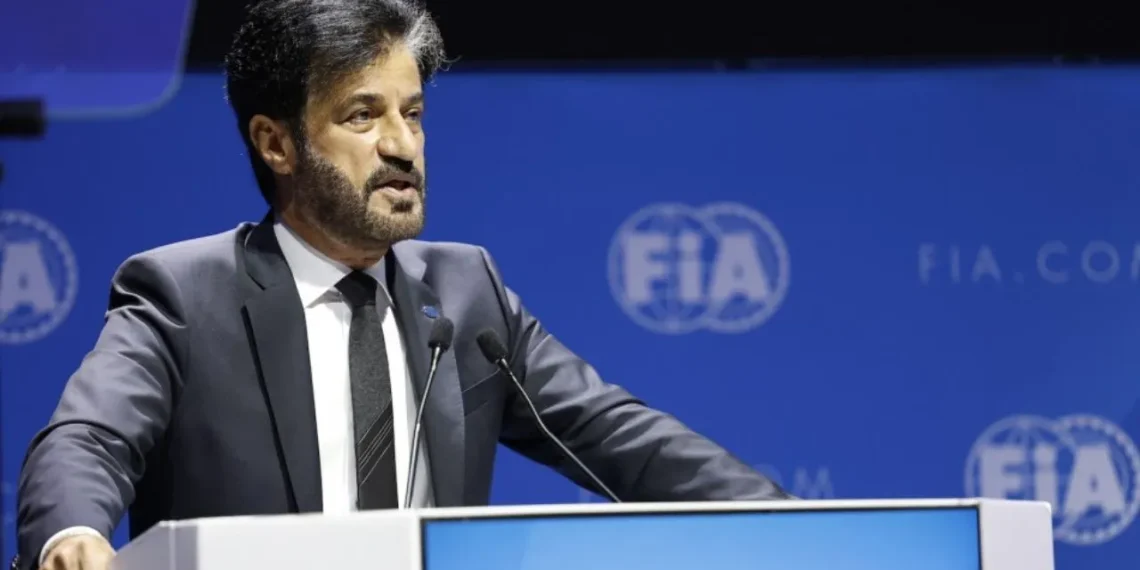Mohammed Ben Sulayem has dropped a bombshell ahead of the 2025 Formula 1 season, confirming that the FIA will introduce “new blood” and a rotating race director system—a dramatic shift in how the sport’s most powerful regulatory body will operate.
After a chaotic 2024 campaign that saw the sudden dismissal of race director Niels Wittich with just three races to go, the FIA President has made it clear that his organization is moving forward with multiple officials sharing race-directing duties, a controversial but calculated decision aimed at ensuring consistency and stability.
But will it work? Or is Formula 1 heading for yet another season of FIA-related turmoil?
Race Direction Overhaul: A Season of Uncertainty?
For years, F1 has struggled to replace the late Charlie Whiting, the beloved and long-serving race director whose passing in 2019 left a gaping hole in the sport’s governance.
Since then, the FIA has cycled through multiple race directors, including Michael Masi, who was ousted after the infamous 2021 Abu Dhabi Grand Prix, and Wittich and Eduardo Freitas, who split duties in 2023 before Wittich took sole control in 2024—only to be unceremoniously axed before the season ended.
In his place, Rui Marques, a former F2 and F3 race director, was thrust into the role for the final three races of 2024 while still juggling his responsibilities in junior categories. The FIA’s decision to make such a last-minute switch stunned teams and drivers alike, raising concerns about leadership instability at the top of the sport.
Now, as Formula 1 heads into 2025, Ben Sulayem has confirmed that a rotating team of officials will oversee race direction, though the exact names and structure remain under wraps.
“Who and how many is a question we will know soon, in the next few days,” Ben Sulayem told Marca.
“But for sure there will be new blood and there will be more than one [race director]—that’s for sure.”
While the concept of multiple race directors might sound logical—ensuring there’s always a backup in case of emergencies—F1 teams are already wary of the consistency issues that could arise.
Having different race directors enforcing track limits, penalties, and safety car procedures on different weekends could open the door to controversial inconsistencies, something that has plagued F1 governance in recent years.
The FIA Under Fire: Ben Sulayem Hits Back at Critics
Ben Sulayem is no stranger to criticism. His handling of recent FIA controversies, including regulatory inconsistencies, team disputes, and even the political tensions surrounding Andretti’s F1 entry, has painted a target on his back.
The latest backlash comes after the FIA’s decision to part ways with race steward Johnny Herbert, citing a conflict of interest with his media work. With F1 fans and insiders accusing the FIA of mishandling its internal structure, the Emirati motorsport chief was quick to defend his leadership.
“It’s easy to blame the FIA,” Ben Sulayem stated bluntly.
“If something happens to me tomorrow, the FIA will continue to function without me, so this has to be a system. It’s not about individuals.”
His message? The FIA is bigger than any one person—including its race directors.
But that logic might not sit well with teams and fans who crave transparency and consistency. With rule enforcement being such a hot-button issue in modern Formula 1, any perceived favoritism or inconsistency in officiating could spark major controversy throughout the 2025 season.
Diversity Debate: A Meritocracy or a Missed Opportunity?
While discussing the FIA’s restructuring, Ben Sulayem also rejected the idea of hiring based on diversity quotas, insisting that only merit and passion should dictate FIA appointments.
“We don’t have women because we have to take 30 percent. We take women on the basis of merit and credibility because they are good,” he explained.
“We hire non-European people from other countries because they are good, they are trained, they have the passion to compete—not because I have to have this color, this religion.”
His comments reflect a firm stance against tokenism, but they also risk alienating those pushing for a more inclusive motorsport environment. In recent years, Formula 1 has made major strides in promoting diversity, with initiatives like We Race As One and programs supporting women in motorsport.
While Ben Sulayem’s argument centers on ensuring FIA hires are based on competence, critics could interpret his stance as resistance to progress, potentially putting him at odds with F1’s broader goals of inclusivity.
What This Means for 2025: Chaos or Stability?
With the 2025 F1 season rapidly approaching, the FIA’s new race director system will be under intense scrutiny from the moment the first lights go out in Bahrain.
Here’s what to watch for:
- Can multiple race directors maintain consistency in officiating? Or will teams be furious over differing interpretations of the rules?
- How will the FIA handle inevitable mid-season controversies? Will a fragmented leadership structure create more confusion instead of clarity?
- Will Ben Sulayem’s leadership continue to divide opinions? Or will the FIA finally earn back the trust of teams, drivers, and fans?
One thing is for certain—the 2025 season will test the FIA like never before.
For now, Formula 1 enters a new era of governance, but whether it’s a step toward stability or chaos remains to be seen.










